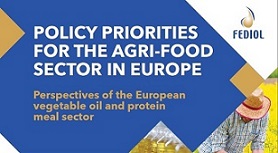
Fediol's statement on Trade Impact of Pesticide Residues workshop
Date
Wed, 11/13/2019
Sections
Agriculture & Food
12 November 2019 - Grain traders, crushers and compound feed manufacturers engage in constructive dialogue aimed at mitigating impacts on trade of the ongoing regulatory transition to lower maximum residue levels (MRLs) for pesticides in commodities
During a workshop held today in Brussels on the Trade Impact of Pesticide Residues, which brought together interested stakeholders across grain commodity supply chains and governmental bodies from the EU and worldwide, COCERAL, FEDIOL and FEFAC invited various experts to analyse the problem and discuss solutions to prevent major supply disruptions.
COCERAL, FEDIOL and FEFAC recalled their commitment to ensure food and feed safety, in a context where EU society supports lower pesticide use and EU authorities are implementing this desire by making the use of plant protection products (PPPs) subject to stricter authorization rules, with a view to strengthen consumer, health and environmental protection.
At the same time, the right of third countries to use a different, risk-based approach for their pesticides’ legislation has been fully recognized. Business operators and authorities have to accommodate the fact that there is no immediate prospect of alignment between the EU and the rest of the world with regard to the assessment of active substances used in plant protection products, even if this remains highly desirable.
In the absence of such alignment, there is need for sufficient predictability and lead-in time for businesses, allowing the supply chain to continue operating. Workable solutions have to be found in the case where the systematic and near-immediate lowering of existing maximum levels would leave business operators exposed to non-compliance and without any possibility for finding operational solutions for the supply chain.
It needs to be recognized as well that efficient farming and integrated food systems need tools for securing quality, safety and volumes of agricultural products, as well as reducing food losses. To date, this seems impossible to achieve without developing alternative practices and less problematic plant protection products.
At a moment when the new EU policy approach for plant protection products is being implemented in Europe, ways need to be found to enhance understanding and convergence on how MRLs should be managed for products that are derived from commodities to which MRLs apply, such as feed materials. The workshop gave about 130 players in the value chain the opportunity to engage openly and share views on the options that would help manage or mitigate the impact on their activities.
For further information, please contact:
Corrado Finardi at COCERAL under the number +32 (0)2 502 08 08
Nathalie Lecocq at FEDIOL under the number +32 (0)2 771 53 30
Alexander Döring at FEFAC under the number +32 (0)2 285 00 50
Quotes or comments:
Iliana Axiotiades, Secretary General of COCERAL: “Traders in agriculture commodities are constantly striving to meet EU demand for food and feed ingredients, and to that end take a variety of measures to help tackle the risk of supply disruption across the different supply chains that rely on imports. This is particularly the case for high-protein sources, where Europe imports over 70% of its needs. We closely work with the other sectors that rely on imports of proteins and share the same concerns related to MRLs on pesticides in order to ensure their input needs are covered”.
Nathalie Lecocq, Director General of FEDIOL: “Efforts have been made to allow a better anticipation of MRL changes. But each active substance needs to be assessed individually as to the risk of potential non-compliance, when the maximum residue levels are reduced. MRL changes cannot be implemented within a few months. Sufficient lead-in times are necessary, to change agricultural practices, to develop alternative substances or to implement new practices that are protective of crops”.
Alexander Döring, Secretary General of FEFAC: “We are also looking for a form of harmonization of how pesticide MRLs in feed are implemented across Europe to preserve a level playing field, and we consider that it would be helpful to find ways for sharing knowledge and information within the feed chain in particular for risk assessment output for feed products. In the same spirit, continuing to build knowledge and convergence on the application of processing factors is desirable”.

